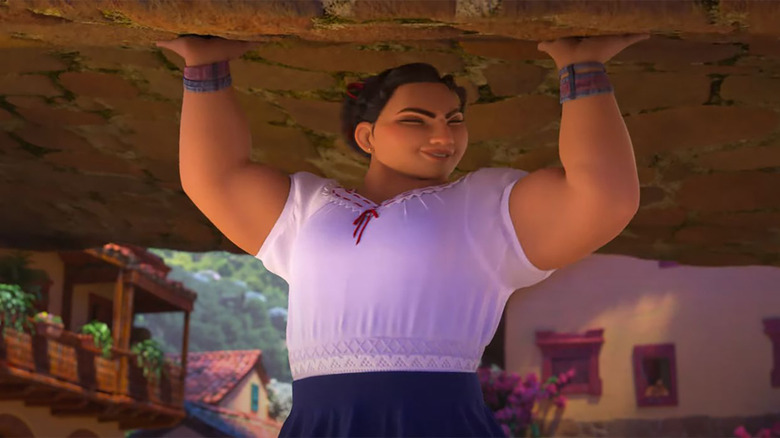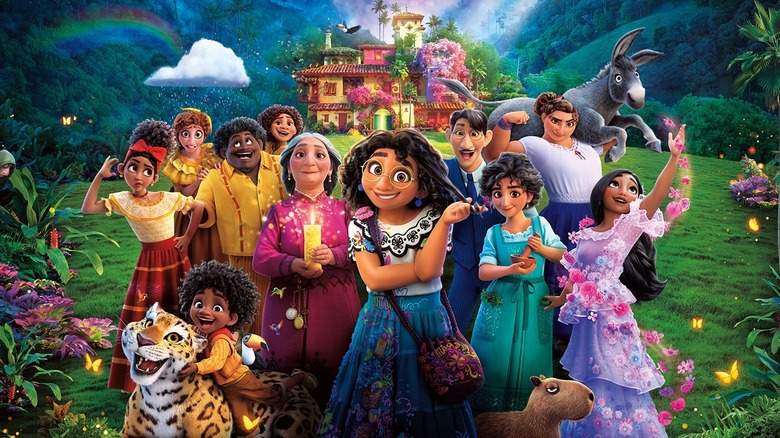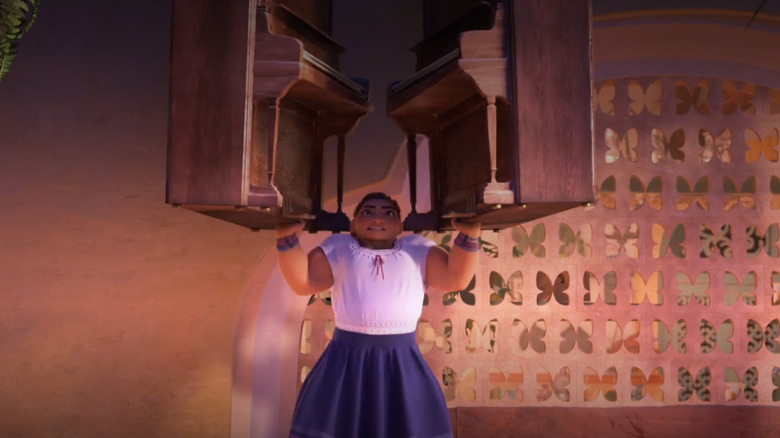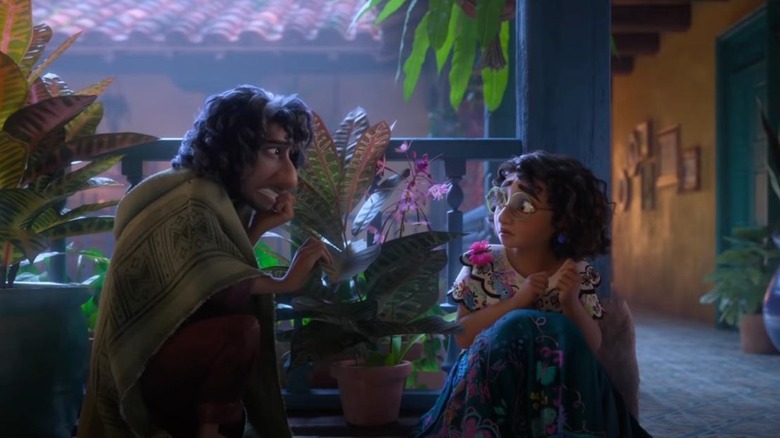The Fight For Luisa's Muscles: How Encanto Dispels The Disney Tradition
I may be a woman in my thirties, but if you think I haven't been scouring the internet for merchandise of Luisa from "Encanto," y'all don't know me very well. From the moment she appeared in the trailer, the internet exploded, expressing their immediate obsession with the "Buff Lady." The obsession didn't stop after "Encanto" made it to theaters, and it picked up even more steam once the film was made available on Disney+. Sure, "We Don't Talk About Bruno" is the biggest Disney song in a quarter of a century, but it's also the massive popularity of Luisa's song "Surface Pressure" sung by Jessica Darrow that helped put the "Encanto" soundtrack at the top of the Billboard top 100. Despite the love both songs have received, Disney didn't submit either as Oscar contenders for Best Original Song, hedging their bets instead on the Spanish-language ballad, "Dos Oruguitas." It's a beautiful song, there's no denying that, but it's the safest possible choice off that soundtrack.
There was obviously no possible way for Disney to have predicted that "We Don't Talk About Bruno" and "Surface Pressure" were going to be the dominant hits over "Dos Oruguitas," but decisions like what to submit to for the Oscars or what merchandise should be made is based heavily on both market testing, and assessing what worked well in the past. Well, "Encanto" has completely shaken up the game, as everything about the film has completely dispelled the Disney tradition, and shows that audiences are craving something new.
Where Is The Family Merch?
If you take a trip over to the Disney eShop looking for "Encanto" merch, it's a pretty telling display of what Disney thought was going to be their money maker. There's plenty of Mirabel centered merchandise, which should be expected as she's the lead. However, when you look at the merchandise centered on the non-Mirabel members of the family, it's an entirely different story. Despite the fact that little boys all around the country are seeing themselves as Antonio, the only Antonio-specific officially licensed toy is a little tree house playset. Isabela, on the other hand, has a garden room play set, a hair play doll, and makeup and jewelry inspired by her outfits. If you're a fan of any of the rest of the family Madrigal, you'll have to purchase the much more expensive full family sets of figurines or the apparel that shows the whole cast.
This is no slight against Isabela, but it's pretty obvious to see what happened here. The quiet girl, the strong girl, the anxious girl, and the non-youngest boys weren't seen as money makers, but the lead character and the "beautiful" sister were. It seems like Disney banked on the fact that outside of the lead, little girls would gravitate toward the pretty and perfect sister who was blessed with the gift to conjure beautiful flowers and plants, the closest thing to a "princess" in the film. While Isabela obviously has her fans (the whole family is great, let's make that clear) it's a shame that the merchandise reflects the perpetuation that beauty is the most important marketing tool for little girls.
Animators Fought For Luisa's Build
Even before "Encanto" was really off the ground, Disney was already falling into traditional habits that would have likely backfired. When people began freaking out over their love of Luisa Madrigal's massive muscles in the trailer, some of the Disney animators on the project confessed that they had to fight for her to look the way she did. An animator who has since made their account private in the wake of the film wrote, "I think we all just wanted to do it in a way that worked well with the style and really made sense for the character and I'm really proud of the way that she turned out." Luisa's super-strength and song "Surface Pressure" are two of the most popular aspects of the film, and it's a bummer that no one had the foresight to think that audiences would want to express that love with their wallets.
"Encanto" is a touching film that deals with generational trauma and familial obligation, two themes that resonate deeply with a huge chunk of the population. As the "fix it, please" and largest statured daughter of the family myself, Luisa resonated with me on an almost religious level. As it stands, I have to purchase designs by Etsy creators who have yet to be slapped with a cease and desist from Disney, because it seems like those in charge of merchandising and marketing didn't anticipate that audiences would embrace her the way they have. Considering they allegedly wanted to shrink her down and not allow her to be tall, strong, and built, Disney clearly felt like Luisa needed to be more or less of the same, and concerned what it would mean to break tradition.
Breaking Generational Curses
If it sounds like I am being too hard on Disney, please understand that my criticism is coming from a place of love and appreciation. Growing up, I was always a Disney kid. Disney movies were and continue to be some of the biggest influences in my life, but I would be lying if I said that they don't also contribute to cycles that are meant to be broken. Disney animated features need to have better representation. Not everyone looks like a princess, nor do they aspire to be one. "Encanto" is a revolutionary effort from the House of Mouse, and I do not want anyone to feel as if my complaints are coming from a place of bad faith.
Disney is the most powerful corporation in the entertainment industry today. They have more money and more influence than anyone else, and there is nothing wrong with wanting to hold them to a higher standard. The central conceit of "Encanto" is learning how to break generational curses and understanding that tradition for the sake of tradition doesn't always help everyone. Progress is important, change is good, and not talking about the problems in your life do not magically make them go away. Everything changed for the Madrigal family when they finally talked about Bruno, and it's time that we finally have a talk with Disney about the ways they can break their own traditions. Trust and believe — it will be better for everyone.



